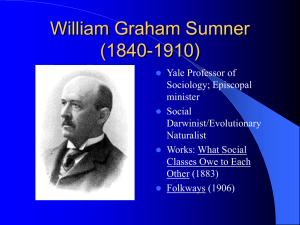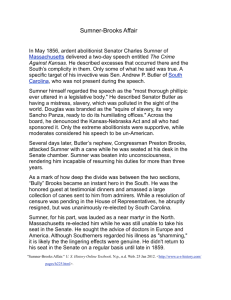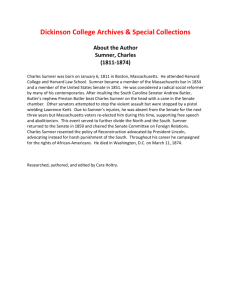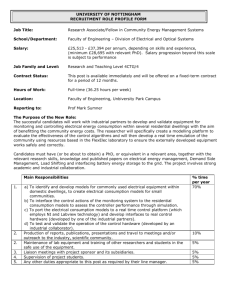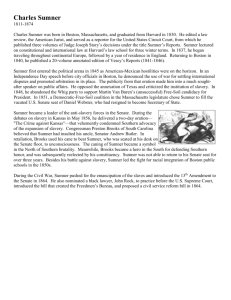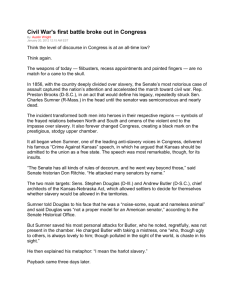THE CHALLENGE OF FACTS 2 - Spring 2016
advertisement
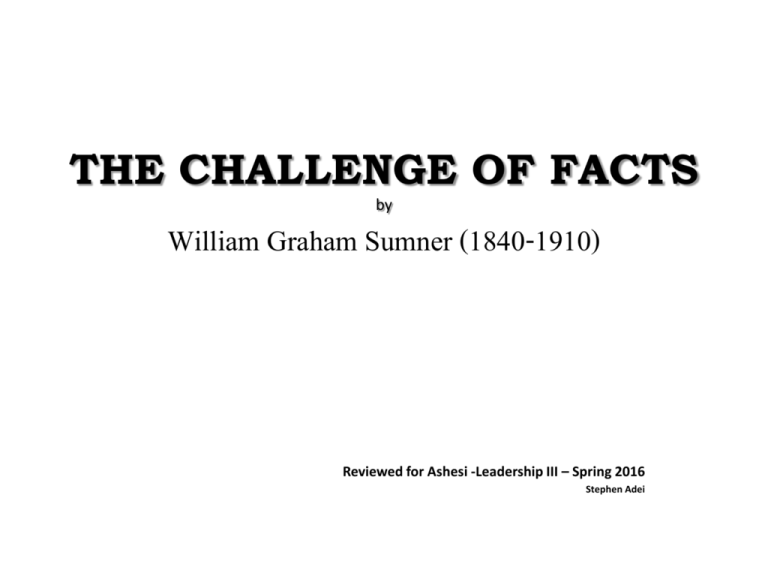
THE CHALLENGE OF FACTS by William Graham Sumner (1840-1910) Reviewed for Ashesi -Leadership III – Spring 2016 Stephen Adei BIO OR PROFILE • American academician and social thinker • (1840-1910) – Greek scholar and clergyman and social and political scientist William Graham Sumner personifies the classical liberal viewpoint often called “libertarian” philosophy • Strong advocate of laissez-faire economics, free trade, gold standard and foe of socialism and communism • He was economic Darwinian i.e. survival of the fittest • Taught social science in Yale as American’s first professor of sociology • Wrote on American history, politics etc. • Most influential on American conservatism • Called the middle class the “forgotten man” ARGUMENT FOR SUMNER Brief summary of article in lieu of 10 pages for each group must prepare for the benefit of other students • Human beings have to engage in a struggle with nature to improve their lot which in the absence of tools (capital) one uses only a miserable existence is assured. In this struggle, there is survival of the fittest. • Capital multiplies immensely the power to produce but itself is the result of deferred enjoyment, invested efforts and those who pay the price become richer (millionaires). Thus it is not wicked to be rich!! The millionaires are the product of natural selection!! But in becoming rich they lift the society as a whole from poverty. • The secret is that in an economy of scarcity, poverty is overcome through production and not redistribution. He does pitch productivity against equality and the poor are responsible for their poverty. ARGUMENT FOR SUMNER cont’d • When we abolish inequality or restrict competition, which he calls a law of nature, in favour of equality and redistribution, the result is large populations that sink into poverty and misery. On the other hand, those who vie for the acquisition of material goods by industry, energy, skill, frugality, prudence and temperance are to be encouraged. Otherwise, no one will work anymore. • He frowns on natural and human rights as by implication, they are demands on others, invariably on productive elements in society. • Equality as proposed by socialists and philanthropists in the end cultivates distress and poverty which they pretend to cure. These he calls “sentimental philosophies” • The state must therefore focus on protecting liberties in the form of each one being allowed to enjoy the results of his efforts, savings, investments and property rather than redistribution, protection and equality. • While conceding that society has come a long way with regard to universal suffrage, popular education, free trade and other innovations including the abolishing of slave trade which he thinks generated it’s own social problems which must now be dealt with now, there is need for institutions to guard civil liberties against popular majorities (one man one vote as against republicanism). CONTRIBUTION TOWARDS THE GOOD SOCIETY DEBATE BY SUMNER • Strong on free liberty and freedom (not his peculiar understanding) but totally against community and equality • He emphasises that competition, productivity and liberty to enjoy the product of one’s labour are the elements of national and individual advancement. • Harsh realities of nature and different capacities of people, effort, disciplines etc means that inequality is inevitable. Some will be rich and others will be poor. • The cost of socialist redistribution and egalitarianism are rather injustice to those who work hard to be rich and infringes on their ‘civil liberties’ to dispose of their wealth as they wish. • He is unequivocally on the side of liberty and efficiency and opposed to equality explicitly and community implicitly of the good society. • Majority rule of modern democracies come under attack as being egalitarian, and there is the need to protect the ‘civil liberties’ of the productive rich. • In his words, being rich is not wicked, and the poor and unemployed are responsible for their state. THE MAIN MESSAGE OF SUMNER • Sumner’s core message is that in a world of scarcity not everyone can compete successfully and that inequality is a fact of life where there is liberty in the sense that “if he employs his energies to sustain the struggle (life) on behalf of himself and those he cares for (legitimately) he shall dispose of the product exclusively as he chooses”. • The way to alleviate poverty lies not in socialist redistribution (sentimental philosophies), especially using state power under democracy but through Protestant ethic of “hard work and self denial” and the state should thus not focus on protection through grandiose social reforms, “but through protection of property, contracts and life”, which he calls ‘civil liberties’. • To him, in a free society, inequality is inevitable. And being rich is neither wicked nor be undermined by egalitarianism. CRITIQUE OF SUMNER’S WORK • • • • POSITIVE CONTRIBUTION He gives the strongest rendering of Max Weber’s Protestant Ethic as foundation of personal and national progress and the rise of capitalism. He highlights the downside of redistribution doctrine and today’s “tyranny” in modern democracies whereby state power is used to further and promote equality, redistribution, labour etc against entrepreneurs, industry, etc and rob the latter of the just rewards of their industry in the name of natural and human rights which are tantamount to demand on others. The need for countervailing forces today to promote hard work, frugality, savings and investments in emerging economies. Lastly his emphasis that being rich is not wicked and that the productive rich lift up society is a strong point. The inventor of spade does the society good and captures only aa small part in personal profit. CRITIQUE OF SUMNER’S WORK THE DOWNSIDE • He unduly disparages those who are poor and unemployed as being at fault and grosses over impediments that many face in society. • While inequality is inevitable in a free society, he has no room for a sense of community in his treatise. • His concept of liberty is limited to enjoyment of the produce of one’s labour and assumes that all capital is acquired through hard work, savings and investments. There is no room for corruption, exploitation in his world. • Whiles he acknowledges progress in education and government promoting social development, he does not seem to encourage them. • Most importantly, his arguments do not acknowledge the fact that today in many countries corruption and abuse of power rather than industry and personal effort underline much of capital accumulation. • In short, the Good Society cannot be built on unbridled competition and efficiency alone. IMPLICATIONS FOR CONTEMPORARY LEADERS • Popular majoritarism, in today’s democracies and implied demands for consumption by all irrespective of contribution has limits. Unless productive elements in society itself is encouraged, society’s progress itself is constrained. • Equality should not be pursued at the expense of productivity and efficiency. • There is need to create an environment the promotes hard word, savings, investments etc and that labour laws should not unduly favour workers against entrepreneurs. • While we must condemn the corrupt thieves, ‘to be rich is not wicked’. • It takes entrepreneurs, innovators, industrialists etc to lift society and not distributive socialists tendencies and the laws of the land should protect the former which is true freedom and liberty SUMNER’S IDEAS ON THE GROUP’S LEADERSHIP THINKING AND DEVELOPMENT • One should adopt a lifestyle that enables one to succeed-self discipline, hard work, savings and investments etc. • Despite progress made in society under democratic regimes, the downside of socialists or “sentimental philosophies” inherent in majority rule should be addressed. • It is easy to major on one side of the elements of good society, efficiency in Sumner’s case, than being balanced.
